At a meeting on May 12, the German club “Concordia” decided to close its club house due to anti-German sentiments. The Berliner Journal stated explicitly that this action was “voluntary”.
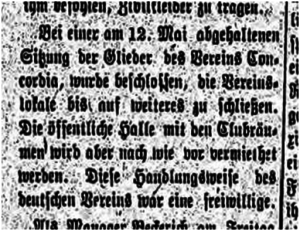
(“Bei einer Sitzung” Berliner Journal, 19 May 1915)
At a meeting on May 12, the German club “Concordia” decided to close its club house due to anti-German sentiments. The Berliner Journal stated explicitly that this action was “voluntary”.

(“Bei einer Sitzung” Berliner Journal, 19 May 1915)
On May 19, the Berliner Journal reported that a newspaper in Toronto had published a dispatch from Galt which stated that German citizens in Berlin had celebrated the sinking of the RMS Lusitania. The editors made it clear that this information was only a rumour and was harming the image of the city. They hoped that the responsible persons in Galt would publicly disclaim the truth of their dispatch.

(“Verleumdung der Stadt Berlin” Berliner Journal, 19 May 1915)
As foreigners did not have to get registered up to that point in Berlin and Waterloo, suspicion grew that “hostile aliens” were hidden in the region. Therefore, several citizens asked the city council to establish a registration office, registering persons who would bring Berlin into disrepute.
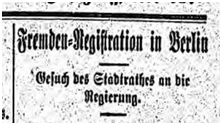
(“Fremden-Registration in Berlin” Berliner Journal, 19 May 1915)
After the sinking of the RMS Lusitania, the Berliner Journal reported an increasing number of anti-German incidents. Several times Germans were arrested due to their ethnic origin as they were suspected of spying. For example, a German bank employee in Berlin was arrested because his suit looked like a German uniform. In Toronto, a promotional sign for a beer brewed in Berlin, Ontario, had to be taken down due to the name Berlin. Even though the sign showed the British flag and said “Made in Canada”, the Toronto city council prohibited the use of the advertisement.
On May 19, the editors published another article regarding anti-German sentiment. The article sympathized with the emotional reactions of the Canadians, stating that the sinking of a German ship would have caused just as much outrage among Germans. Furthermore they praised the Canadian government for intervening in violent actions against the German population. The article encouraged Germans to stay quiet and refrain from patriotic statements in order to show their loyalty and remain safe.
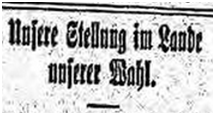
(“In Preston” Berliner Journal, 12 May 1915; “Ein junger angestellter Deutscher” Berliner Journal, 19 May 1915; “Protest gegen deutsche Bieranzeige” Berliner Journal, 19 May 1915; „Unsere Stellung im Lande unserer Wahl“ Berliner Journal, 19 May 1915)
On May 26, the Berliner Journal reported on the arrest of 51 Austrians in Guelph. The newspaper stated that six Austrians had come to the police station, asking to get arrested as they had no jobs and could not make a living. Thereupon the police commissioner in Ottawa commanded that every Austrian in Guelph should be arrested. 51 Austrians voluntarily got arrested and were brought to the detention camp in Toronto where they would be employed until the end of the war.
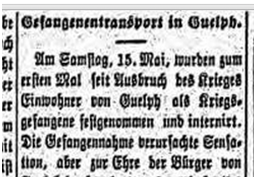
(“Gefangenentransport in Guelph” Berliner Journal, 26 May 1915)
Due to the war it was hard to get German goods shipped to Canada. Therefore, the German book store suffered from a decrease in profits as German books could not be purchased from Germany anymore.
In other industries, however, the shortage was overcome. In January 1915, the Berliner Journal stated that a German citizen of Berlin had learned how to brew beer that was as good as the beer previously imported from Germany. Therefore, the German population did not have to miss their imported beer anymore.
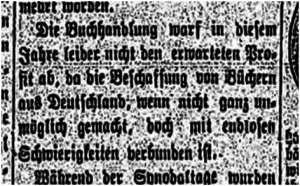
(“Einen Vortheil” Berliner Journal, 13 January 1915; “Die Buchhandlung” Berliner Journal, 02 June 1915)
After several violent incidents against German-Canadians, the Berliner Journal published an editorial regarding the current situation of the German community. The editors praised the Canadian government for making a distinction between Germany and its war efforts and the German-Canadian population. They stated that several German-Canadians held responsible positions in politics thanks to the government. Canadians appreciated “German attributes” such as diligence, loyalty, and efficiency. The German population therefore should contribute to the Canadian economy as much as possible, thus showing their loyalty. Furthermore, the editors made it clear that any anti-German actions did not reflect the Canadian government but were war-motivated and not approved by the government.
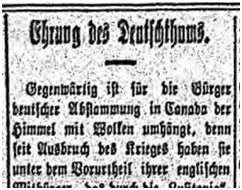
(“Ehrung des Deutschthums” Berliner Journal, 02 June 1915)
A German newspaper published a letter from the daughter of a dentist to the emperor. It was written in January 1915 to achieve a specific aim. The little girl lived in Switzerland with her family and she had seen the emperor during a state visit. She asked him for help because her little cousin, who was on holidays in Mühlhausen (Alsace), was not allowed to travel back because of the war and strict rules. The family wanted to keep her with them in Switzerland until the war ended. The girl thought the emperor could arrange this as everybody had to obey him. Another cousin of the two girls would fight for the emperor at the Russian front. The girl also offered to do him a favor and wished him a belated happy birthday, health and imminent peace. After that letter was made public the cousin was allowed to return to Switzerland.
(„Ein Kinderbrief an den Kaiser“, Berliner Journal, 9 June 1915)
This was an appeal from William Jennings Bryan to the German-Americans to maintain the peace between the United States of America and Germany by persuading the German government not to take any steps which could lead to war. He emphasized that one could not compare the relationship and conversations between the United States and Germany and the United States and Great Britain. Both countries would judge the current President Wilson unfairly.
(„Bryan an die Deutschen“, Berliner Journal, 23 June 1915)
In the following passage, the opinions of German politicians towards the war and the will of the nation was presented. The socialist Heinemann argued that no German would want peace until the nation’s enemies were ready to let Germany develop its economic and cultural powers. Dr. Braun reported that the socialists wanted the German nation to stand together against their enemies, but that the Germans did not want conquests or annexations, as some politicians seemed to want. The Prussian Interior Minister said that the only aim should be ending this war in a way that there would be no repetition of it.
(„Radikale Sozialisten für Frieden“, Berliner Journal, 30 June 1915)